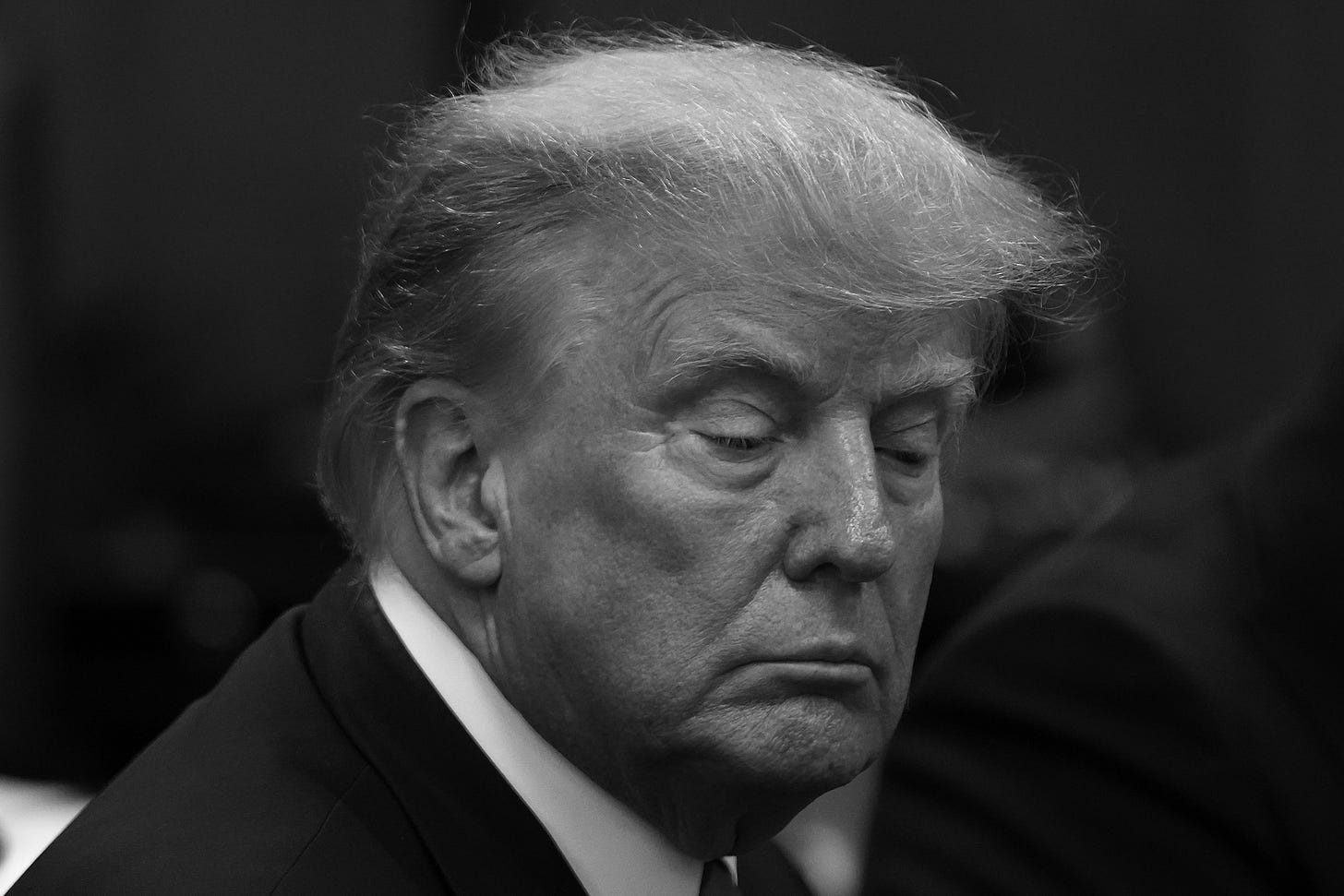No One Above the Law: Trump Indicted on Federal Charges
The long-anticipated charging of the former president shows a Justice Department worthy of its name.

And now there are two.
With a federal grand jury’s indictment of Donald Trump for conspiring to obstruct justice, unlawfully taking and keeping top secret government documents, and willfully retaining national defense materials, the former president sets a sad historical marker unlikely ever to be matched. Already the only president to be impeached twice, Trump has now been indicted twice—including, now, by the nation he once led.
According to reporting tonight from the New York Times, as well as a statement from Trump himself, the former president has now been charged with crimes by two different grand juries in two different jurisdictions—one state and one federal—on two completely different sets of facts for two entirely different sets of crimes.
That’s happened before to those who live—as many think Trump has lived—on the wrong side of the law. But never before to someone who ascended to the pinnacle of American power and who aspires to that position again, followed by tens of millions of Americans eager to install him there by any means available, lawful or otherwise.
At long last, the republic strikes back.
The two-and-a-half year delay in any federal charges since Trump left office forced many concerned Americans to wonder whether this Justice Department would protect the fundamental precept that no one, however powerful, is above the law. We now have Jack Smith’s emphatic response.
In charges resulting from the special counsel’s investigation, we finally see a constitutional system asserting itself full force over a defiant scofflaw. History tells us that strong institutions prevail over strong personalities in such battles, at least when institutional values are backed by the beliefs and actions of dedicated citizens.
There’s an irony in the new indictment for Trump: By declaring his candidacy early in the apparent hope that a timid attorney general would back off, Trump instead caused Attorney General Merrick Garland to name Smith as special counsel. Who knows whether today’s indictment would ever have been handed down had Trump not tried to bully Garland into dropping the investigation into the once and would-be future president’s criminality?
For all that’s new here, we shouldn’t miss something old. Experienced criminals understand that when they violate the law, the next step is to wipe the crime scene to cover up their wrongdoing. That throughline of coverup appears both in this federal indictment and in the state indictment a Manhattan grand jury returned in March.
There, Trump was indicted for falsifying business records to hide the truth about paying Stormy Daniels $130,000 in hush money through his fixer, Michael Cohen. In that case, the prosecution’s theory is that Trump made the payment because he did not want the public to know, on the heels of the Access Hollywood tape’s release weeks before the election, of his tryst with Daniels.
In essence, Trump sought to hide his true identity from the American electorate. Later, he did not want New York State’s tax or election law authorities to know that he was reimbursing Michael Cohen for making that secret payment. So, per the statement of facts accompanying the indictment, he covered up the truth with business records deliberately mischaracterizing the reimbursements as legal expenses.
The pattern parallels that of the coverup alleged in today’s indictment. According to the Times’s reporting, the federal grand jury charges an obstruction meant to conceal Trump’s retention of the classified documents he filched from the White House to hide at Mar-a-Lago. He stonewalled for 18 months, then responded to a subpoena for security camera video with footage containing unexplained gaps, and then apparently moved documents and engineered lies to impede the attempts of the U.S. government to retrieve them.
The crimes being covered up here include violations of the Espionage Act—violations that may be aggravated by any evidence that Trump showed the documents to third parties. So this coverup looks like an exception to the rule that the coverup is worse than the crime.
Still, attempts to evade legal accountability by concealing wrongdoing justifiably infuriate those who enforce the law. Proving such efforts also helps establish a guilty state of mind, the most difficult element to prove in white-collar crimes like those for which Trump now stands twice indicted.
Espionage, obstruction, and coverup dramatically distinguish Trump’s case from those involving classified documents found at the homes of President Joe Biden and former Vice President Mike Pence. In sharp contrast, both cooperated with the government’s requests for the documents’ quick return.
Observers may voice concern that this second indictment could add fuel to Trump’s fiery claims of victimhood and thus further strengthen his hand in the GOP primaries. There’s no way to know for sure; the impact in the general election could well be just the opposite. Regardless, trading in political futures isn’t the job of prosecutors. Their mission is to enforce the law.
Although innocent until proven guilty, Trump now faces grave consequences for his conduct, consequences he famously predicted he could escape for any wrongdoing. Two prosecutors have now given the lie to that boast, as has a system of government whose centerpiece for 234 years has been the rule of law. We have “a republic,” Benjamin Franklin said, and today, a second grand jury composed of ordinary citizens has affirmed that it wishes to keep it.







